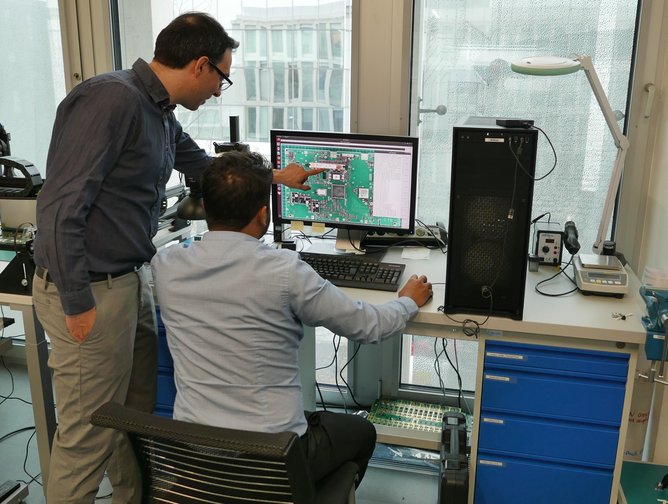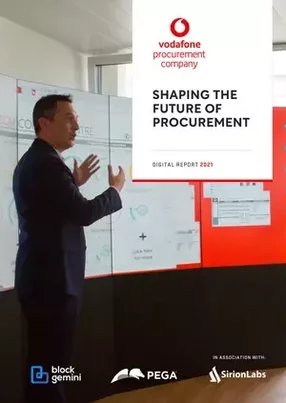Defining the efficacy of a digital transformation in procurement seems straightforward on the surface. You can consider the facts by measuring efficiency and productivity metrics or tally up the black ink on quarterly financial results. But the full story is written in the detail. In making areas of user experience and ESG commitments tangible, reportable and manageable.
As Global Head of SCM Digital & Operations at Vodafone, Reinhard Plaza-Bartsch is driving the telecoms giant’s supply chain digital transformation journey. His vision is that digital will transform the way we work, fostering a culture of innovation and driving more sustainable value creation. It will empower individuals to do more, through outstanding user experience, boost productivity and reshape how we collaborate across organisations.
“Digitalisation will unlock exponential value for our business,” he says. “As a function, we want to push the boundaries of what can be achieved through technology and innovation. Having a vision and lining up a clear roadmap of new capabilities interlocked with the business is an essential part of the journey.
“You need to start from the basics - typically opportunities that will free up capacity of commercial teams so that they can devote more time to more value-adding activities. However, you need to shift gears quickly, go beyond simple automation, and equip teams with new digital solutions that go beyond bridging process gaps and providing data insights to enable business foresight. In other words, enabling fully end-to-end connected solutions that provide transparency about what is happening in their area of spend. Extending the reach to identify external factors that will influence the business and leveraging artificial intelligence to advise and recommend the best course of action to minimise risks and maximise the value for the organisation.”
Plaza-Bartsch joined Vodafone 14 years ago in the nascent era of digitalisation, when centralization and standardization were the buzz words of the hour. That initial unification process took some years to accomplish but resulted in “a data foundation for the supply chain organisation” that has been instrumental in accelerating the digital transformation over the past five years.
“The degree of insights that we can get from the data that we've created over those years is tremendous,” says Plaza-Bartsch. “We can see how our operations perform in real-time, identify patterns and behaviors in our business and take laser sharp actions to drive performance. We can see how our users are leveraging certain datasets, what is becoming more relevant to them and how they are unlocking value for the business. Beyond our operations, we are helping our suppliers and partners improve their performance through our insights and the actions we have taken.
“We are now also using some predictive models to proactively manage and mitigate risks, although this is an area where there is still a big opportunity to scale further. Getting access to data has been one step in our journey; this has now moved towards turning data into business insights that are meaningful and relevant. This has enabled us to achieve world-class performance and drive consistency across all categories and regions.
“What’s great in our function is that no matter where you are in the business, you will have access to the same information, same dashboards and analytics, and enjoy the same and unique user experience across our processes.”
While business insights are a great asset to give you a view of what is happening, we are already leading into applications that provide business foresight. We want to take a more proactive and long-term perspective to potential risks and issues that may impact our supply chain. This can range from simple business trends being contextualised for category teams, to more advanced risk modelling solutions that enable our business to take data-driven decisions on more complex scenarios.
The next step in the journey is to make data actionable, and where possible autonomous. You can think about this being a “companion or assistant” for a category manager, Plaza-Bartsch says, which equips them with the information they need to make decisions based on empirical evidence, rather than relying on heuristics or decontextualised data.
“Going a step further, we intend to leverage artificial intelligence to autonomously identify patterns and prompt action, and eventually… enable our systems to autonomously take decisions,” he adds.
While all the new tech is great, securing a consistent and outstanding user experience is a cornerstone to any successful digital transformation. “You need to keep a close focus on user experience to drive adoption,” says Plaza-Bartsch. Enhancing user experience has been a long objective of Vodafone’s supply chain digital transformation. As far back as 2017 the company began measuring user experience across all its procurement processes and systems. Using a net promoter score - a simple but effective questionnaire, that is automatically triggered when people interact with the digital solutions, asking users to gauge how likely they would be to recommend the SCM solutions - the results were underwhelming. On a scale from -100 (everyone hates the system) to +100 (everyone loves the system) the score came back at -37.
“Naturally what this told us was we needed to do something, and so we did,” Plaza-Bartsch says. “While we couldn’t find any company trending on the positive side of user experience with procurement systems, we are strong believers that improving user experience helps our organisation to become leaner and more agile. It also helps us drive operational excellence and attract talent. People want to work with companies that have great tech, where they can unlock their potential and actually maximise their contribution to the organisation, rather than being consumed by administrative activities.”
Today that score sits 117 points higher at positive 84. “User experience is and will always be something to chase, Plaza-Bartsch admits. “This is basically because our expectations as individuals continuously evolve. We are all exposed to great user experience in everyday applications we have in our private lives, so naturally our expectations will not be different at work.”
The improvement achieved in user experience represents a complete turnaround in the course of just three years. That development will continue as Vodafone continuously influences the innovation roadmap of its partners, but also through a new approach to partnerships which is taking shape through the development of new SCM systems. Instead of buying ready-made solutions, Vodafone is driving innovation by teaming up with a number of partners to develop new capabilities, including software firms outside the traditional sphere of procurement software solutions.
One good example of this drive for innovation is Vodafone’s vision of autonomous journeys across the whole supply chain.
“This is a very ambitious project we are doing with PegaSystems. Today we call it Autonomous Procurement, however, we expect it to quickly expand beyond procurement to a truly integrated and automated supply chain ecosystem” Plaza-Bartsch says. “We’ve worked hand-in-hand with our category teams to shape the user journeys in the procurement space as a start, and on this basis we are beginning to add on the capabilities that make buying simpler and faster for the business, while also creating competitive tensions. Our ambition is that this becomes a fully autonomous, end-to-end solution, where everything from supplier selection, to contracting and risk management happens automatically, all on the platform. We are moving here clearly from a digital-first to a digital-only mindset.
“We are very proud to have launched our MVP (minimum variable product). This is truly agile development where we are getting to see how the product shapes every other week” Plaza -Bartsch adds. “The platform is still in its early stages and needs greater human oversight to function properly than when it is complete, but having an MVP up and running has been an important step in solidifying Vodafone’s leadership position.
“When we set our vision, we initially went to market to find an off-the-shelf solution that will meet our objectives. We invited 30-plus different partners and came to realize that the landscape wasn't ready. That gave us an indication that this is an area where we should invest more time and develop something to maintain our leadership position for the future. We believe such a solution will be relevant not just for Vodafone, but also for our partners.”
Alongside evolving the core functions of its procurement division, Vodafone is also leveraging its digital transformation to encompass environmental, social and corporate governance (ESG) objectives. Plaza-Bartsch says: “Supply chain is a key contributor to Vodafone’s purpose agenda. This is by embedding planet and society objectives across everything we do, from how we make decisions (policies) and how we run our business (processes and systems), enabling us to influence and align our more than 10,000 global suppliers around common objectives.”
Sustainability, diversity and inclusion have become core concerns for the private sector, but many businesses continue to grapple with exactly how to quantify them, and how to link them to business objectives. At Vodafone, Plaza-Bartsch’s approach is to make them tangible and transparent so that they can be managed.
“For example, we have embedded purpose commitments in our sourcing process,” he says. “When evaluating suppliers for new work, 20% of our scoring criteria will account for their commitments to diversity, inclusion and the environment. Enabling this through our systems has been key to secure a consistent implementation across our spend.”
Likewise, to support a reduction of carbon emissions objectives, Vodafone is leveraging big data to access and create full transparency of its CO2 footprint. "For us the use of technology is essential to understand and predict CO2 emissions growth through our supply chain” Plaza-Bartsch says. “By creating this visibility, we can be more targeted when selecting areas of opportunity to actively drive a reduction in emissions on a year-by-year basis by working with our partners on greener technologies and solutions.
“It’s the same for ESG. We expect that the demand for information and transparency across our supply chain will continue to rise. We will see larger and more connected ecosystems that will contribute richer information to enable business foresight at scale.
“Innovation has become the new normal across our digital transformation journey and our culture. Customer experience will continue to be an uncompromised priority, combined with an obsession for speed and simplicity across all our user journeys. This will enable us to scale commercial and operational value to Vodafone, and beyond that, enable lasting and impactful improvement to society and our planet.”


